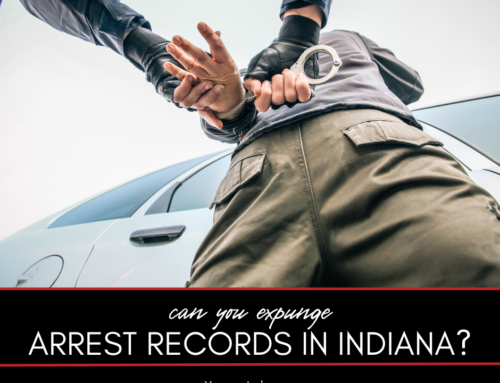
If you’re like many people, you want to clear your criminal history – but you’re not quite sure where to begin, what the process entails or what the end result will actually be. Fortunately, we’re here to help. Check out this Indiana expungement FAQ to get answers to all your questions. And if you don’t see what you’re looking for here, you can always call us at 317-647-5476 to talk to an attorney in a free consultation.
Indiana Expungement FAQ
Check out the most common questions we hear about Indiana expungement:
- Who’s eligible for expungement?
- Do I have a criminal record if I was found not guilty?
- Can I expunge my record if I pled no contest?
- What if I have multiple court cases?
- Why would the state of Indiana deny my petition?
- Is there a benefit to expunging my record in Indiana?
- What happens if I don’t expunge my records?
- What if I don’t know what’s on my criminal record in Indiana?
- Why should I hire an expungement lawyer in Indiana?
Here’s a closer look at each. And remember, if you don’t see the answer to your question here, call us at 317-647-5476.
Who’s Eligible for Expungement in Indiana?
You may be eligible to expunge your criminal record in Indiana if you meet the right criteria. You can usually expunge the following offenses:
- Misdemeanors
- Class D felonies
- Some Class C felonies
- Level 1 through Level 6 felonies
- Pretrial diversion records
- Unrelated traffic offenses
- Some juvenile offenses
Some records are never eligible for expungement though. Typically, those that involve violence are off the table for expungement and must remain on your criminal record forever. Some of those crimes include:
- Murder
- Attempted murder
- Voluntary manslaughter
- Battery resulting in serious bodily injury (as a Class A, B or C felony)
- Child molesting (as a Class A, B or C felony)
- Robbery (as a Class A, B or C felony)
- Arson (as a Class A, B or C felony)
- Kidnapping (as a Class A or B felony)
- Rape (as a Class A or B felony)
- Criminal deviate conduct (as a Class A or B felony)
- Criminal confinement (as a Class A or B felony)
- Dealing in or manufacturing schedule I, II, III or IV controlled substances (as a Class A, B or C felony)
- Dealing in methamphetamine (as a Class A, B or C felony)
Usually, people are eligible for expungement only one time during their lives, so make sure you use your chance wisely. Don’t reoffend, because if your criminal record has been expunged once, everything that occurs after that date must remain on it permanently.
Related: What if a prosecutor objects to your expungement?

Do I Have a Criminal Record if I Was Found Not Guilty?
Many people are surprised to discover that they have criminal records. Sometimes, people are arrested, released without charges or even brought to court where the charges are dropped. In some cases, people are found not guilty and incorrectly assume that they don’t have a record because of the disposition of the case. However, if you’ve ever been arrested, you have a criminal record – regardless of what happened after your arrest.
The good news is that you can typically expunge arrest records. In fact, you can expunge any record that never led to a guilty conviction. Even if you were arrested for a very serious crime, including one on the earlier list of crimes that can never be expunged, you’re eligible to clear your record if you were never convicted.
Related: Indiana’s Second Chance Law
Can I Expunge My Record if I Pled No Contest?
If you pled no contest to criminal charges and were therefore convicted, you may be eligible to expunge your record as long as the crime falls on the list of eligible offenses. Usually, you must wait a specified period of time before your record becomes eligible for expungement. That’s where your attorney comes in; you can talk to your attorney about all the offences on your criminal record and determined whether you qualify for expungement, whether you pled guilty, no contest or not guilty. Often, even the outcome of your case doesn’t matter when it comes to expungement. It’s possible to expunge some crimes even after you were convicted.
What if I Have Multiple Court Cases?
If you have multiple cases on your record, you may apply to expunge those that qualify. However, in the state of Indiana, you only get one shot to apply for expungement.
If you have cases in different jurisdictions, you must file petitions in each of them. Though the state says you only have one shot to apply for expungement, it actually gives you a period of one year to handle all your cases. That means if you have a record in Gary, one in Indianapolis, one in Fort Wayne, two in Evansville and another pair in South Bend, you have one year from the date that you filed your first petition to complete the rounds. Many people choose to work with an Indiana expungement attorney, particularly if they’re tackling multiple records in multiple cities. That’s because the paperwork can quickly become overwhelming and unmanageable, and leaving it with an attorney helps ensure then nothing slips through the cracks.

Why Would the State of Indiana Deny My Expungement Petition?
Sometimes expungement cases don’t make it through the process. The biggest reasons the state of Indiana denies expungement petitions involve errors or inaccuracies in the paperwork, having pending charges, and not meeting the required waiting period.
- Errors in the paperwork. If your court file is inaccurate, or if your expungement petition contains errors, your case cannot proceed through the court system.
- Having pending charges. You can’t apply for expungement if you have pending charges in any jurisdiction in Indiana.
- Not meeting the required waiting period. Generally, you must wait a certain period of time after a conviction or the completion of your sentence before you can apply for expungement. If you haven’t waited long enough, your petition can’t go through the court system.
Related: Criminal convictions you can expunge in Indiana
Is There a Benefit to Expunging My Record in Indiana?
There are plenty of benefits to expunging your criminal record in Indiana. The most obvious is that when your record is expunged, employers, landlords and others are not allowed to hold it against you, even if you’ve been convicted of a crime. Although some of the items on your record may still be visible to the public after expungement, the law forbids people from discriminating against you when your record is expunged. Essentially, expungement is away for the state to say, “Yes, we know you committed this offense, but you’ve paid your dues and we’re all good now.”

What Happens if I Don’t Expunge My Records?
If you don’t expunge your criminal record, you can expect employers, landlords and creditors to encounter it. Anyone who runs a background check on you will be able to see your criminal past, as well as the fact that your record hasn’t been expunged. Sometimes, having a criminal record can hold you back. It may prevent you from getting a job, finding a place to live or even getting a loan.
What if I Don’t Know What’s on My Indiana Criminal Record?
It’s okay if you don’t know exactly what’s on your Indiana criminal record. If you know you have a record, your Indiana expungement attorney can conduct a background check and find out what, exactly is on your record. From there, you and your attorney can work together to determine the next steps.
Why Should I Hire an Expungement Lawyer in Indiana?
Many people find that it’s worthwhile to hire an expungement lawyer in Indiana. That’s because expunging a record takes time and a little know-how. Your attorney can handle all of your paperwork for you so you don’t have to worry about a thing. Basically, you let your lawyer know that you want to expunge your record and they handle the rest.
Related: Who can see your criminal record in Indiana?
Do You Need to Talk to an Indiana Expungement and Sealing Attorney?
If you’re ready for a fresh start, we may be able to help. Call us at 317-647-5476 or fill out the form below for a free consultation on expungement. We’re here to answer your questions and get you the fresh start you deserve.













